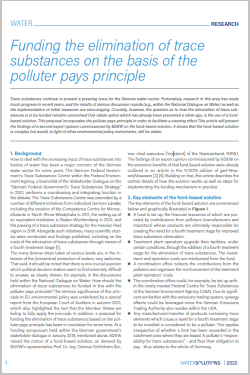November 15, 2022 | Trace substances continue to present a pressing issue for the German water sector. Fortunately, research in this area has made much progress in recent years, and the results of various discussion rounds (e.g., within the National Dialogue on Water) as well as the implementation of initial measures are encouraging. Crucially, however, the question as to how the elimination of trace substances is to be funded remains unresolved.
One viable option which has already been presented a while ago, is the use of a fundbased solution. This proposal incorporates the polluter pays principle in order to facilitate a steering effect. This article will present the findings of a second expert opinion commissioned by BDEW on the fund-based solution. It shows that the fund-based solution is complex but would, in light of other environmental policy instruments, still be viable.
Background
How to deal with the increasing input of trace substances into bodies of water has been a major concern of the German water sector for some years. The German Federal Government’s Trace Substances Centre within the Federal Environment Agency, a brainchild of the Stakeholder Dialogue on the “German Federal Government’s Trace Substances Strategy” in 2021, performs a coordinating and integrating function in the debate. The Trace Substances Centre was preceded by a number of different initiatives from individual German Länder, including the creation of the Competence Centre for Micropollutants in North Rhine-Westphalia in 2011, the setting up of an equivalent institution in Baden-Württemberg in 2012, and the passing of a trace substance strategy for the Hessian Ried region in 2018. Alongside such initiatives, many scientific studies were conducted and findings published, including on the costs of the elimination of trace substances through means of a fourth treatment stage [1].
The many diverse steps taken at various levels are, in the interests of the (preventive) protection of waters, very welcome. That said, it should be noted that there is one crucial question which political decision makers seem to find extremely difficult to answer, as clearly shown, for example, in the discussions held within the National Dialogue on Water: How should the elimination of trace substances be funded in line with the polluter pays principle? The intrinsic significance of this principle to EU environmental policy was underlined by a special report from the European Court of Auditors in autumn 2021, which also highlighted the fact that the Member States are failing to fully apply the principle. In addition, a proposal for funding the elimination of trace substances based on the polluter pays principle has been in circulation for some time: At a funding symposium held within the German government’s stakeholder dialogue in January 2019, mentioned above, BDEW raised the notion of a fund-based solution, as devised by BDEW’s representative Prof. Dr.-Ing. Dietmar Schitthelm (former chief executive [Vorstand] of the Niersverband, NRW). The findings of an expert opinion commissioned by BDEW on the economic benefits of that fund-based solution were already outlined in an article in the 11/2019 edition of gwf-Wasser | Abwasser [3] [4]. Building on that, this article describes the central details of how the solution works as well as steps for implementing the funding mechanism in practice.
Read the full report here








